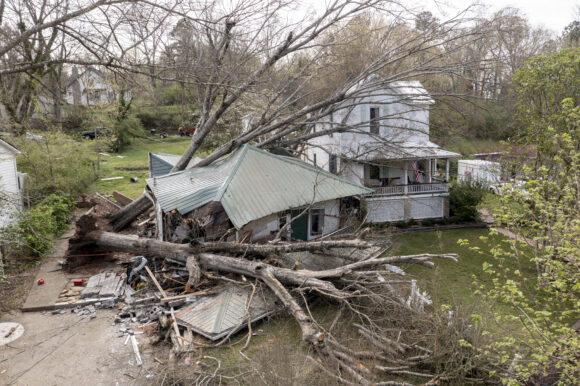Swiss Re warned insurers Tuesday that secondary perils such as thunderstorms and wildfires are making up a growing share of the losses caused by natural catastrophes, even in a year that experienced an abnormally active North Atlantic hurricane season.
The reinsurer said in its annual catastrophe report that secondary peril events accounted for 71% of 2020 natural catastrophe insured losses, which totaled $81 billion. Primary perils caused $23 billion in insured losses.
“There were a record-breaking 30 named storms during hurricane season 2020 and a further record was set when 12 of those made landfall in the US,” stated Martin Bertogg, Swiss Re’s head of catastrophe perils. “It cost the insurance industry $21 billion in claims. Yet, incredibly, we would regard that as somewhat of a lucky escape.”
The report says climate change and urban sprawl are driving the increased losses.
A graphic that accompanies the report shows that losses caused by secondary perils have fluctuated from 20% to 90% of insured losses since 1970, but have exceeded 50% of insured losses in each of the last 10 years.
Severe thunderstorms —including the tornadoes that they spawn — consistently cause the greatest insured losses among the secondary peril types, accounting for $36 billion in insured losses in 2020.
But wildfires are growing in significance, accounting for $11.6 billion in insured losses last year.
The report says wildfires have caused a cumulative $56.3 billion in insured losses from 2011 to 2020. By comparison, wildfires caused a cumulative $8.7 billion in losses from 2001 to 2010, $5 billion from 1991 to 2000 and $1.4 billion from 1981 to 1990. All of those figures are converted to 2020 values.
Wildfires made up 23.3% of insured losses caused by secondary perils from 2016 to 2020, the report says, calling the share of losses “unprecedented.” Before 2016, wildfire losses rarely exceeded 5% or 10%.
Floods that aren’t associated with named storms are also a growing risk, Swiss Re says, accounting for a $67.3 billion in insured losses globally from 2011 to 2020. Flooding caused by hurricanes and typhoons is considered a primary peril.
“Primary perils are well-monitored by the insurance industry, but secondary-peril risks less so,” the report says. “Risk assessment efforts need to rebalance to make secondary perils a priority.”
But Swiss Re also urges insurers not to forget primary perils. The reinsurer said “while secondary peril losses have accumulated faster in the last five years, history shows that it can take just a few peak-event strikes to demonstrate the very large magnitude of losses that primary peril risk poses, as in the case of Hurricanes Katrina, Wilma and Rita in 2005.”
About the photo: This image taken by a drone shows two trees resting on the badly damaged property at 733 Branch Drive following a day of extended severe weather, Friday, March 26, 2021, in Helena, Ala. (AP Photo/Vasha Hunt)
Was this article valuable?
Here are more articles you may enjoy.


 Cape Cod Faces Highest Snow Risk as New Coastal Storm Forms
Cape Cod Faces Highest Snow Risk as New Coastal Storm Forms  Charges Dropped Against ‘Poster Boy’ Contractor Accused of Insurance Fraud
Charges Dropped Against ‘Poster Boy’ Contractor Accused of Insurance Fraud  Canceled FEMA Review Council Vote Leaves Flood Insurance Reforms in Limbo
Canceled FEMA Review Council Vote Leaves Flood Insurance Reforms in Limbo  Elon Musk Alone Can’t Explain Tesla’s Owner Exodus
Elon Musk Alone Can’t Explain Tesla’s Owner Exodus 